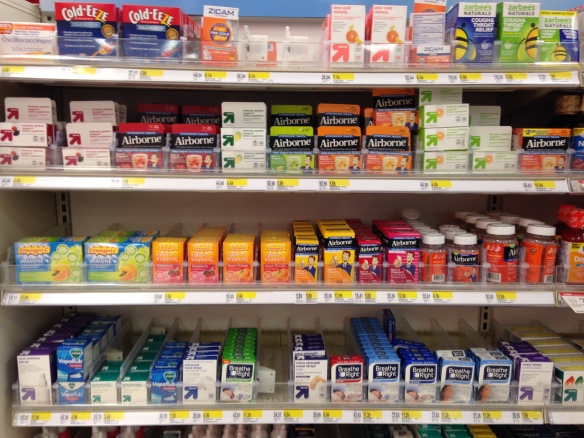
Source: Stephen Craven [CC-BY-SA-2.0 (http://creativecommons.org/licenses/by-sa/2.0)%5D, via Wikimedia Commons
Colds are not a serious condition, but their impact can be big. One estimate suggests that colds result in the loss of approximately 22 million school days and 20 million work days, as well as 25 million visits to the family physician annually (Heikkinen 2003).
How do we manage the common cold?
Despite the significant impact colds have on on school, work and health care, there is no widely available cure or vaccination. One of the most common ways parents manage a child’s cold is to dash to the nearest drug store and pick up an over-the-counter cough and cold medication to remedy those leaky noses and sore throats. These over-the-counter (OTC) medications often have combinations of up to three different ingredients: antihistamines, analgesics, and decongestants. Although combinations of these therapies are often found in OTC cough and cold medications, researchers do not fully understand if they are helpful for improving cold symptoms.
A Cochrane Review looks into whether your dash to the drug store is worthwhile, by assessing the effectiveness of different combinations of antihistamines, analgesics, and decongestants. Evidence comes from a group of 27 randomized controlled trials involving over 5,000 participants. Unfortunately, only part of that evidence comes from studies including children or adolescents.
Let’s talk about the results from studies with different therapy combinationsOral-antihistamine and decongestants: Seem to provide overall relief from common cold symptoms in adults, but results are unclear for young children.
Oral decongestants and analgesics: Children had reduced duration of nasal congestion and swelling in one study, but this is not enough evidence to determine if all children will have the same response.
Oral antihistamine-decongestant and analgesic: Children had reduced nasal stuffiness on the 5th day of treatment, but experienced no other benefits.
So many treatment options, but should we use them and which ones to pick?
Based on this review, we know there is mixed evidence for the use of medications with combination therapies to relieve common cold symptoms. In fact, many of the trials including children and adults report adverse events, the most common being: dry mouth and insomnia in those who took antihistamine-decongestants and dizziness in those who took analgesic-decongestants. The review heavily cautions that adverse events are more common in children taking a combination therapy, suggesting parents should be wary of giving their children these medications.
An excerpt from a commentary by Dr. Ricardo Fernandes in response to this review provides a meaningful summary: “Over-the-counter drugs capitalize on the temptation of a quick recovery…Combined formulations have added risks. They provide false illusion of synergism…the safety issues of decongestants in young children are well known. Rational prescribing for the common cold means focusing on safe and effective symptomatic treatments (e.g. analgesics) and excluding the rest (Fernandes 2013).”
What do the guidelines suggest?
In tune with our discussion, the Canadian Paediatric Society states, “Despite their widespread use among children, the use of over-the-counter cough and cold medications is not effective in most cases and is potentially harmful.” (Goldman 2011). Specifically, the CPS highlights unintentional overdose in children under the age of 2 as a primary concern.
Before giving a child over-the-counter medications to treat their cold-related symptoms, parents must think twice.
Links/References :
Heikkinen T, Järvinen A. The common cold. The Lancet. 2003;361(9351):51-59
Oral antihistamine-decongestant-analgesic combinations for the common cold; Cochrane Summary
Ten Things Physicians and Patients Should Question – American Academy of Pediatrics (AAP)


Pingback: Honey: An effective cough remedy for kids? | Cochrane Child Health